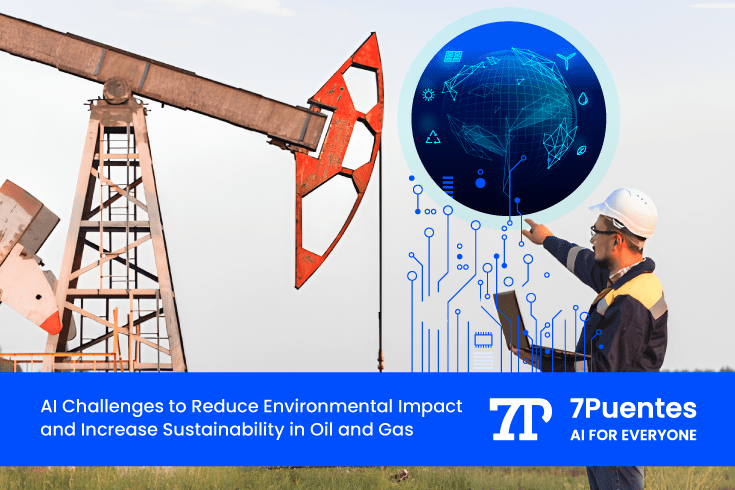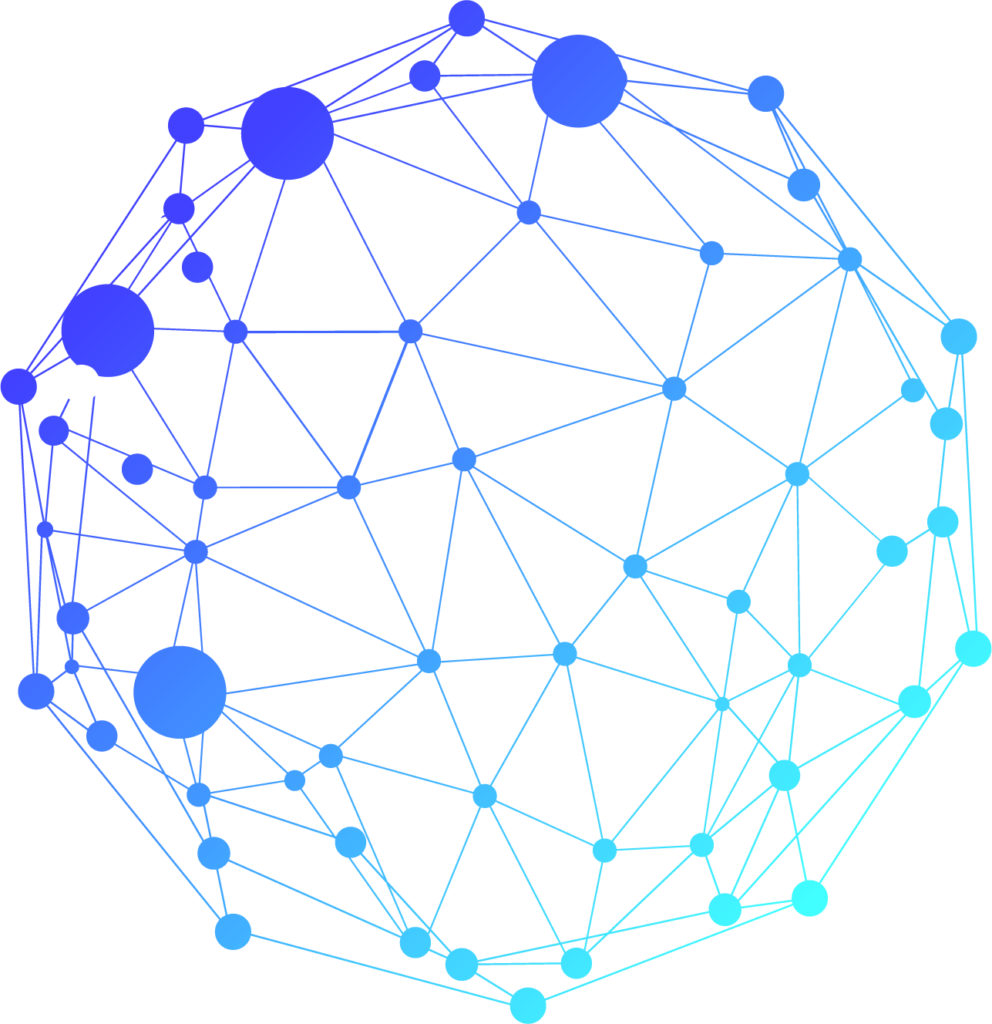AI in oil and gas sustainability is rapidly becoming a cornerstone for environmental transformation in the energy sector. As the industry faces unprecedented pressure to operate more efficiently and reduce its environmental footprint, artificial intelligence emerges not just as a tool, but as a strategic enabler. In this post, we explore the key challenges and opportunities of applying AI to enhance sustainability in oil and gas, along with real-world use cases developed by 7Puentes.
Artificial Intelligence (AI) has the potential to significantly reduce the industry’s environmental impact by enabling better resource management, waste reduction, and compliance with regulatory requirements. At the same time, companies can improve their engagement with the communities in which they operate, demonstrating their commitment to safety and environmental sustainability through the use of AI technology.
A recent analysis by PwC, Microsoft, and the University of Oxford suggests that, in the next decade, AI could contribute significantly to energy sustainability, even offsetting its own high energy consumption.
Although the growing adoption of AI has raised concerns about rising energy consumption, especially due to the expansion of data centers that support these systems, the study’s results offer an optimistic view: this technology has the potential to revolutionize energy efficiency in various sectors and reduce greenhouse gas emissions, driving the transition to a more sustainable future.
The research aimed to model the economic impact of applying AI to manage the environment in four sectors: agriculture, water, energy, and transportation. The report estimates that the use of AI for environmental applications could contribute up to $5.2 trillion to the global economy by 2030, a 4.4% increase relative to business as usual.
In parallel, leveraging AI could reduce global greenhouse gas (GHG) emissions by 4% by 2030, an amount equivalent to 2.4 Gt CO2, equivalent to the 2030 annual emissions of Australia, Canada, and Japan combined.
In the oil and gas industry, various solutions are being implemented to reduce environmental impact, such as using natural gas instead of diesel in drilling equipment and early detection of pipeline leaks using fiber optics.
In turn, artificial intelligence and the use of intelligent agents ensure more efficient processes, enabling predictive maintenance, continuous monitoring, and operational safety, thereby reducing the risk of accidents (loss of life and property damage), lowering operating costs, and mitigating environmental impact (reducing the risk of spills or leaks, for example).
Three Local Cases Demonstrating AI in Oil and Gas Sustainability
A) Pan American Energy’s pilot test in Aguada Pichana Oeste, where gas-powered generators were used in drilling operations, reducing CO2 emissions by 50% and generating savings of USD 100,000 per well.
B) Meanwhile, Xcel Energy, a utility company that burns coal and emits nitrous oxide, is implementing AI to better predict energy consumption patterns and adapt its operating systems, increasing efficiency by more than 20%, a considerable parameter for a company in this sector.
C) A recent technical report entitled «Artificial Intelligence to Optimize Water Logistics and Transportation in Vaca Muerta«—disseminated within the AI Tech Hub ecosystem—details how AI can revolutionize the operations of the leading companies in this field. From water demand prediction to route optimization and predictive maintenance, AI applications promise to take water management in Vaca Muerta to a new level of sophistication.
AI is transforming the Vaca Muerta oil and gas industry by optimizing water logistics and improving operational efficiency. AI enables the analysis of large amounts of data in real time, facilitating more accurate decision-making and process automation. This results in increased productivity and reduced costs. There is a constant stream of data: 35 million data points per well are processed in real time using predictive models that enable highly accurate decisions about direction, pressure, and velocity.
7Puentes’ Role in AI in Oil and Gas Sustainability: What We Do and How We Do It
In our role as strategic consultants, we can affirm that artificial intelligence is a transformative reality in the energy sector, where the convergence of AI and human talent development is key to driving efficiency, safety, and sustainability in the industry.
At 7Puentes, we are 100% aligned and committed to this vision, developing multiple AI solutions that are already generating a sustained impact, powered by the latest generation of Machine Learning and Gen AI:
- Intelligent management of technical documentation.
- Predictive asset monitoring.
- Early detection and explainability of anomalies.
- Advanced incident prevention systems, management of health and safety observations, and adjustment of asset integrity plans.
In this favorable context, we can mention at least three relevant projects:
1) Management of industrial safety and hygiene observations in the Oil and Gas industry.
The client has too many safety observations, and the analyst team fails to read and process them in a timely manner. This leads to delays in implementing preventive measures and a potential decrease in the effectiveness of safety programs.
Our solution was to develop a language model that allowed for different categorizations and prioritizations. A heat map was created, divided by organizational area, to provide an action and continuous improvement plan. Among the benefits obtained, analyst productivity increased 100-fold, and a real-time heat map was generated, reducing safety risks and improving the company’s sustainability.
2) Predictive maintenance and anomaly detection in Oil and Gas.
The problem encountered was that information from maintenance work orders did not correlate with real-time information. In this sense, fault detection systems were not adequately labeled to enable predictive maintenance systems with machine learning. And the work order information wasn’t integrated into real-time systems.
The solution we developed at 7Puentes was to generate a Gen AI model to extract structured information from the work orders. A heat map was created, divided by organizational area, to create an action and continuous improvement plan. The main benefit was a data set for creating customized fault detection models and new insights in the company’s dashboard to prevent anomalies. This is directly related to reducing risks and environmental impact.
3) Classification of technical security documents and information retrieval using MLOps.
At 7Puentes, we used the MLOps methodology for this automatic text classification project, allowing us to develop solutions that facilitate or accelerate our work with our clients. In this way, 7Puentes collaborated intensively and efficiently with the company’s Machine Learning and Data Science departments, which required a technical solution tailored to the specific needs of these teams.
The use of MLOps has significantly reduced time and improved data ingestion, model training, and project delivery. The benefits translate directly to the safety field. Of course, the use case can be tailored to each project’s objective, thanks to the flexibility of the methodology. This framework is of great value to both our technical development and our teamwork.
Another advantage of our development is that it can be used for any type of safety observation, as we have conducted A/B testing based on the problem to be solved and have been able to combine different language modeling techniques. This allows us to develop models targeting BERT (an optimal bidirectional transformer model for understanding the full context of text), Embedding Classifier (a classifier based on text embeddings, efficient and fast to train), and LLM (Large Language Model, capable of understanding complex nuances in text).
Opportunities for AI in Oil and Gas Sustainability
The opportunities in the Oil & Gas industry are countless. The Oil & Gas industry is integrating sophisticated artificial intelligence tools at an ever-increasing pace and with increasing intensity. In this context, Gen AI projects are beginning to multiply and are seeking to reach a stage of maturity.
In this way, industry managers and executives will benefit in the short and medium term, directly or indirectly, by accessing consolidated know-how from experiences applying generative artificial intelligence in the energy sector and achieving increasingly controlled, efficient, safe, and sustainable processes.
You can find more information and benefits of our development Chat with your data, in previous publications such as A reliable and secure Chatbot for Oil & Gas companies and Chat with your data: Multiple Connections in Oil and Gas.
Final Thoughts
Our region has the resources, human talent, and opportunities to be a key player in the global energy revolution: extraordinary natural resources, top-tier technical talent, and a mature industry. We firmly believe that energy development is one of the key drivers for growth. And AI is the tool that will multiply that impact.
The integration of artificial intelligence into the energy industry represents a necessary step toward developing good, more sustainable, and efficient practices. As companies in our region seek to diversify their energy sources and reduce their dependence on fossil fuels, AI is positioned as a key solution to achieve these goals and improve sustainability.

